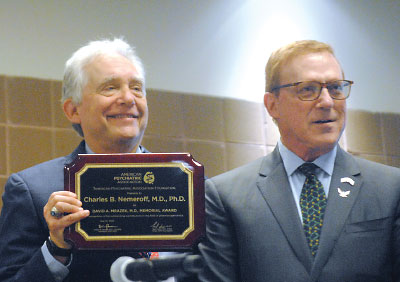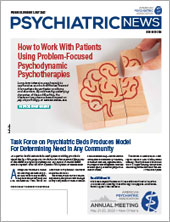It’s a question that is bandied about psychiatry meetings every year: Do pharmacogenetic tests offer information that doctors can reliably use to improve depression treatment? The answer in 2022, according to this year’s David A. Mrazek Memorial Award recipient Charles Nemeroff, M.D, Ph.D., is a resounding NO.
“There is still no evidence to support that commercial pharmacogenetic tests can improve patient care,” said Nemeroff in his award lecture at this year’s Annual Meeting. Nemeroff is a professor and the Matthew P. Nemeroff Endowed Chair of Psychiatry at the University of Texas at Austin Dell Medical School.
It was a blunt statement from the recipient of the APA award that recognizes an outstanding clinician in the field of pharmacogenomics named after the late Mayo Clinic researcher and pharmacogenomics pioneer David A. Mrazek, M.D. But one that was fitting, said APA CEO and Medical Director Saul Levin, M.D., M.P.A., who was on hand to present the award to Nemeroff.
“[Charles] does not sugarcoat anything,” Levin said. “But once he gets to know you, he is a wonderful friend and colleague. And on top of that he is a true leader and a humanitarian in our field.”
Clinical features such as depression symptom severity, socioeconomic factors, and/or the presence of childhood trauma can identify patients who might be likely to need more intensive treatment. But there is little guidance on which medication is best for individual patients with a disorder that can present in over 20,000 symptom combinations, Nemeroff said.
Commercially marketed pharmacogenetic tests, known as combinatorial tests, offer to do that work for clinicians; they sample genetic variants present in key metabolic enzymes or neurotransmitter receptors and then use algorithms to produce drug recommendations and/or warnings about which medications to prescribe.
Nemeroff acknowledged that many psychiatrists, himself included, have been rooting for years for pharmacogenetic tests to help guide antidepressant selection. But the evidence for these tests making any difference for patient outcomes is lacking.
Nemeroff led the APA Task Force for Novel Biomarkers and Treatments that took a comprehensive look at all these different tests and their extraordinary claims, and in 2018, they published a report stating that almost all the available data were of poor quality and that there was insufficient evidence to support pharmacogenetic testing in practice (Psychiatric News, July 20, 2018). The only test that they noted might be worthwhile involved variants of the CYP26D enzyme, which they said could help guide dosing strategies to reduce side effects.
In 2019, however, Assurex—a personalized medicine company that markets pharmacogenetic tests—published data from a study of over 1,100 patients suggesting that using its new test during antidepressant selection could increase the rate of depression response and remission. However, a closer look at that trial found that there was no difference between pharmacogenetic-guided care and standard care in the key metrics of symptom change on the Hamilton Depression Rating Scale or prevalence of side effects after eight weeks. The remission rate was statistically higher in the pharmacogenetic-guided group (15% vs. 10%), but Nemeroff noted these numbers were suspiciously low compared with other clinical trials.
Subsequently, two academic groups, one at Harvard Medical School and one at the Mayo Clinic, conducted their own head-to-head comparisons and found no benefits for pharmacogenetic-guided care in any depression outcome. Nemeroff said the Mayo Clinic study was especially eye-opening. “Mayo has a financial stake in the Assurex platform, so for them to publish a negative study was something.”
Starting in 2019, the FDA began issuing warnings to some pharmacogenetic testing companies that the agency felt were making unsubstantiated claims about their products. In July 2020, Medicare also declined to support coverage for any combination pharmacogenetic tests used in psychiatry due to insufficient data.
Nemeroff said that the pharmacogenetic field is not finished yet. Preliminary studies have uncovered variants that might be useful for certain populations; an example is a variant of the norepinephrine receptor that may predict older adults with depression who will respond to venlafaxine. And as genomic studies continue to uncover more genes involved in depression, more viable contenders may emerge.
It’s also possible that reliable clues to guide medication choice may be outside the realm of genomics. For example, promising research has shown that neuroimaging may be useful for identifying specific brain circuits involved in antidepressant response. However, Nemeroff acknowledged the costs of that brain imaging may make it unlikely for use as a routine way to guide medication treatment. He noted that EEG may offer a less expensive way to scan the brain, but cautioned this tool is not ready for primetime either.
It’s important the field keep pushing despite setbacks, Nemeroff said. The longer patients fail to improve on an antidepressant, the more likely it is that they won’t improve, increasing the odds of poor quality of life, suicide, or mortality from another medical cause.The failure to achieve remission is frustrating for clinicians, “but it is absolutely dire for patients,” he said. ■

